Veranda Tales-People’s poet

Storytelling has been an integral part of my life since childhood. I grew up listening to stories during the hot summer evenings and nights with my cousins. Mothers and grandmothers would gather all of us children for story time. It was usually pitch dark except for a very faint light coming from the flickering candle. Power cuts were as frequent as the hot and humid summer days. We all spread out on a cool concrete floor or bamboo mats on the veranda intently listening to fascinating stories about kings, queens, princes, princesses, and peasants alike. Stories about love, life, families, and people entertained and taught us life skills. These stories transported us to distant worlds, strange yet familiar. Often the same story told by two people sounded different as storytellers added new twists and turns adding their personal style and flair to the stories.
Storytelling wasn’t limited to summer evenings and bedtime. I was surrounded by adults who didn’t pass up an opportunity to share their wisdom using the art of storytelling. These rich vibrant oral traditions include songs, poems, stories, and సామెతలు (Sametalu are proverbs in Telugu). Men and women sing songs as they work in the fields, grinding grains and spices and doing other daily chores at their homes. Stories are often used to teach important life lessons, interpersonal skills, and survival skills. These stories and the time spent listening to them made our lives richer leaving an impression on me. This series is all about reliving those memories as I share these stories.
కంచు మ్రోగునట్లు కనకంబు మ్రోగునా (kanchu mroginatlu kanakambu mroguna)?
When I complained while working on my handwriting homework about how I could not write well, నానమ్మ (Nanamma is paternal grandmother in Telugu) would break out into reciting this poem,
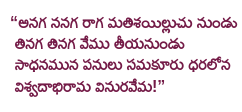
She would either recite the whole poem or just say, తినగ తినగ వేము తీయనుండు, which means, “if you eat neem leaves long enough they will taste sweet.” She had just the right poem to quote or recite for any occasion. When we came across a person who talked about how much money they had, అమ్మ (Amma is mother in Telugu) would say, “కంచు మ్రోగునట్లు కనకంబు మ్రోగునా?”, to make a point that a humble and good person wouldn’t talk about their wealth.
Every Telugu speaker at one time or the other recited or heard somebody recite a వేమన (Vemana)’s poem or a verse from one of his poems. యోగి వేమన (Yogi Vemana) was a Telugu poet, philosopher, and social reformer. According to some sources he was born in 1652 AD and died in 1730 AD at the age of 78. Others say he was born in the fifteenth or sixteenth or seventeenth centuries. There is no consensus on his lineage or timeline.
Some sources say he was the third and the youngest son of గడ్డం వేమ రెడ్డి (Gaddam Vema Reddy), the king of కొండవీడు (Kondaveedu) kingdom near Guntur in the state of Andhra Pradesh. He was a warrior known for his strength to have taken on and defeated a raging bull wreaking havoc in the village. He lived a life of luxury during his younger years. He frequented places of prostitution and enjoyed carnal pleasures. He didn’t heed the advice of his older brother, sister-in-law, and his lover, విశ్వధ (Viswadha), who was afraid for his life. Even if his enemies wouldn’t get him, విశ్వధ (Viswadha) thought he would waste his life away going after frivolous experiences. He was having the time of his life taken up by a new love interest, a beautiful courtesan. He was spending a lot of time with her and became the target of one of his enemies. He was poisoned by his new lover under the orders of one of his father’s courtiers, a minister. He was taken to a forest and left to die.
అభిరామ (Abhirama), a forest dweller and doctor, found వేమన (Vemana) in a state of delirium with a very faint pulse. అభిరామ (Abhirama) carried వేమన (Vemana) back to his hut in the forest and nursed him back to life. The poison took a toll on వేమన (Vemana)’s health. He stayed with అభిరామ (Abhirama) during and after his recovery helping him forage medicinal herbs and plants. He wanted to repay అభిరామ (Abhirama) for saving his life. While he was working for అభిరామ (Abhirama), he came in contact with a Yogi who bestowed his wisdom on him before he died. The story reads like a Vulcan mindmeld where the dying Yogi transfers all his knowledge to వేమన (Vemana). After this incident వేమన (Vemana) started his poetic and yogic life traveling from place to place reciting poems.
Other sources say వేమన (Vemana) was born into a poor farming or laborer family. He had a thirst for knowledge and approached a pandit begging him to be his teacher. Pandit gave him an assignment to write the word, “Rama '' on a rock with a chalk several times until he was asked to stop. While వేమన (Vemana) was working on his assignment, pandit left to run errands. When he came back hours later, he found వేమన (Vemana) still hard at work writing with swollen and bloodied fingers. Pandit was impressed with వేమన (Vemana)’s dedication and took him under his wing. It doesn’t matter which story you believe, both of them end with వేమన (Vemana) becoming a poet.
His 100 poem collection is known as వేమన శతకం (Vemana Satakam), where శతకం (Satakam) means hundred. He shared his wisdom in a colloquial Telugu language which became part of the Telugu collective wisdom. వేమన (Vemana)’s poems were written in ఆటవెలది (Aataveladi) genre of Telugu rhyming poetic style. Telugu poetic styles are adopted from Sanskrit styles using the same predefined groups of syllables.
Telugu poem structure:
- Each line in a Telugu poem is called a పాదం (paadam is foot).
- Each పాదం (paadam is foot) should contain a specified number of predefined groups of syllables called, గణాలు (ganalu) in Telugu.
- ప్రాస (Praasa) is rhyming rule that says second letter (a consonant) of each పాదం (paadam) should be the same. ప్రాస (Praasa) means rhyme.
- యతి (Yati) is a pause in the flow of the words. The యతి (Yati) rule stipulates that the first letter of the పాదం (paadam) and the letter at the యతి (Yati) position should be different. Poetic styles defined where the యతి (Yati means pause) should occur.
- ప్రాసయతి (Praasayati) is another rhyming rule that allows the use of ప్రాస (Praasa) letter in the యతి (Yati) position.
ఆటవెలది (Aataveladi) poem structure and rules:
- Each poem should have four పాదాలు (paadalu means feet in Telugu).
- Each పాదం (paadam is foot) should have 5 గణాలు (ganalu are groups of syllables).
- The first and third పాదాలు (paadalu) should contain 3 సూర్య గణాలు (Suryaganalu), and 2 ఇంద్ర గణాలు (Indra ganalu).
- The second and fourth contain 5 సూర్య గణాలు (Suryaganalu)
- There is no ప్రాస (Praasa) rhyming rule.
- ప్రాసయతి (Prasayati) can be used in place of ప్రాస (Praasa)
Following the ఆటవెలది (Aataveladi) rules, వేమన (Vemana)’s poems have four పాదాలు (paadalu means feet in Telugu) each. The fourth and the last పాదం (paadam is foot) in all his poems is “విశ్వదాభిరామ వినురవేమ (viswadabhirama, vinura vema). The meaning of this signature phrase is “Vema, listen to విశ్వధ (Viswadha)’s and అభిరామ (Abhirama)’s wisdom”. He was addressing himself in third person advising himself to listen to విశ్వధ (Viswadha)’s and అభిరామ (Abhiram)’s wisdom. Adding this phrase as the last line of all his poems, వేమన (Vemana) honored his lover, విశ్వధ (Viswadha) and his best friend, అభిరామ (Abhirama). Some versions of this narrative say విశ్వధ (Viswadha) was his sister-in-law. Either way విశ్వధ (Viswadha) was someone he looked up to and was near and dear to him. The phrase survives the end of time as it is part of the collective wisdom of generations of Telugu people.
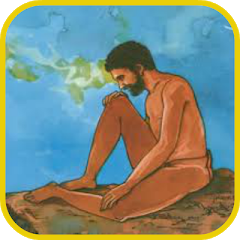
వేమన (Vemana)’s poems are full of life lessons, moral, and reformative messages. His poems convey important information in a poetic form very effectively. Each poem has a message with examples to illustrate the message. They are relatable and easy to understand. He utilizes the power of examples and comparisons to clearly explain complex concepts and moral conundrums faced by people. The messages in his poems have survived the test of time and are still relatable today. In some poems he starts with examples first and ends with a message, while in others he starts with the message and ends with examples. Each of his poems contain one or two examples and a message. Here is a selection of his poems that speak to me.
వేమన (Vemana) on the importance of sustained practice to learn a skill
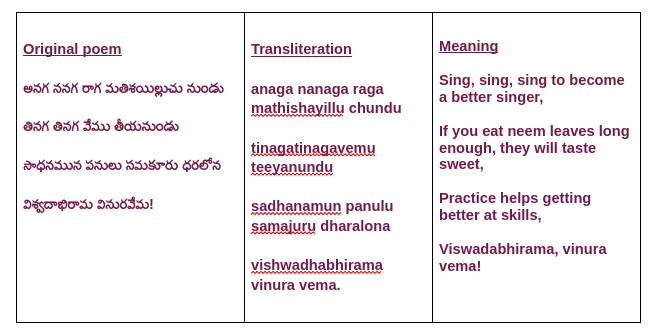
This poem emphasizes the importance of practice to learn and improve a skill. If you want to improve your singing, you have to practice several times. You have to put in the work to get better at doing things. I worked hard to improve my handwriting after I heard this poem from నానమ్మ (Nanamma). I am glad she passed on the wisdom of వేమన (Vemana) to her next generation.
వేమన (Vemana) on the futility of performative arts of worship
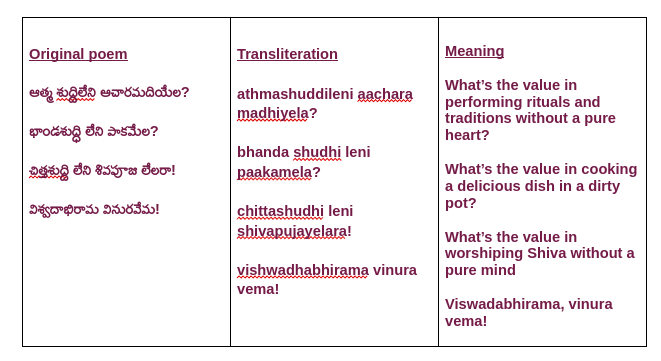
This poem questions the value of traditions and rituals practiced by people without a pure heart. He compares it to the futility of cooking a delicious dish in a dirty pot. He says it is worthless to worship శివ (Shiva) without a pure heart. He says that it is more important to put in the work to develop a pure heart rather than blindly following rituals and traditions with an impure heart. In this context being a a pure hearted person means a good person, who doesn’t think ill of others and doesn’t judge others harshly. The word “think” is important here. A good person is empathetic in his thoughts and words. It is more important to be a good person than to engage in performative acts.
వేమన (Vemana) on good behavior by comparing a humble person to gold
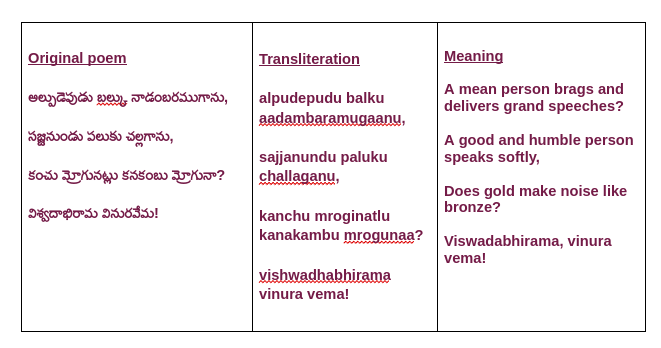
This poem talks about how one can’t measure a person by how they talk. A good person is humble and modest. A mean person on the other hand is flashy and prone to bragging. వేమన (Vemana) asks if gold is noisy like bronze, comparing gold to a good person and a mean person to bronze. He uses poetry to convey important information very effectively in a subtle form. He doesn’t say gold is like a good person. He prompts his readers to infer that by asking a question to get them to think. Whenever I come across someone bragging about their wealth, I hear అమ్మ (Amma) saying “కంచు మ్రోగునట్లు కనకంబు మ్రోగునా?” in my head.
వేమన (Vemana) on the value of a simple meal prepared with a good heart
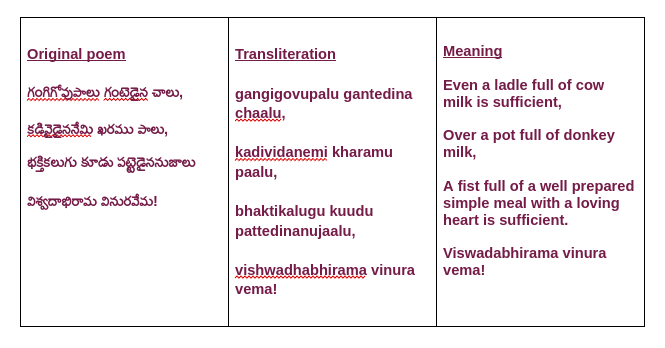
This poem talks about the benefits of a well prepared simple meal with a loving heart. వేమన (Vemana) compares a ladle full of cow milk to a pot full of donkey milk to illustrate his message. Eating a simple meal prepared with love is like drinking a ladle full of cow milk. He is urging his readers to look at the quality over the quantity. Whenever I hear this poem, I almost gag at the thought of drinking donkey milk.
As I write this story, I can’t help but ponder, what if our beloved ప్రజాకవి (prajakavi means people’s poet) వేమన (Vemana) lived only a life of a prince and a king? What if he didn’t become a yogi and left this world without giving us the gift of his wisdom and knowledge? The Telugu language wouldn't be as rich as it is today. The Telugu people are indeed richer with this wealth of knowledge.
I am thankful for having grown up listening to adults around me quoting and reciting వేమన (Vemana)’s poems to impart wisdom and to teach important life lessons. I am grateful for the rich body of his work which is now part of my vocabulary and continues to offer life lessons. The messages in his poems have survived the test of time and are still relatable today. వేమన (Vemana) proved that pen is indeed mightier than the sword.
